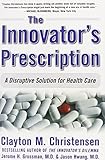This is exactly what needs to be changed in order to disrupt healthcare. Once medical care becomes procedural (ie generated by smart software, per patient, based on the patient's electronic health record which includes genomic and molecular data), we can begin replacing highly specialized doctors with non-specialized ones (and eventually with nurses). Of course, there are probably tons of areas where "simpler" checklists can be made to have a significant impact on outcomes (for example making sure the right patient gets the right drugs, etc..).
Clay Christensen's book, Innovator's Prescription, goes into a lot of detail about how this will most likely play out: http://www.amazon.com/Innovators-Prescription-Disruptive-Sol...


Most people talk about ideas and politics without getting into the technical details of what's happening.
The Innovators Prescription[1] is written by 3 PhD's (2 in medical and running institutions and one in business) who provide an analysis as part of the book.
[1] https://www.amazon.com/Innovators-Prescription-Disruptive-So...